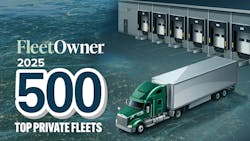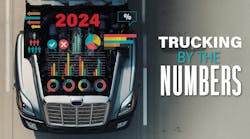Key takeaways:
- In 2025, WM and AT&T swapped positions while PepsiCo remains the largest over-the-road private fleet at No. 2.
- The list highlights sanitation, food service, and construction, with Amazon and Walmart leading in e-commerce logistics.
- Rankings rely on ProsperFleet's data from FMCSA filings for accurate fleet assessments.
Some of America’s best-known brands wouldn’t be where they are today without the ability to move their goods—or the equipment and tools to provide their services. Commercial vehicles and fleet management make all of this possible.
Companies are constantly re-evaluating how they manage their transportation. During the pandemic, more companies saw the benefits of controlling their capacity by growing their tractor and trailer populations. Other companies looked for competitors to acquire or re-evaluated outsourcing their transportation services.
These decisions made at large and small companies continue to significantly impact the FleetOwner 500: Private, our annual ranking of commercial fleets for companies whose primary business is not trucking. The 2025 FleetOwner 500: Private welcomes 65 new companies to the list; five companies moved into the top 100. We also had three companies tie for 500th place, so the FO500 actually has 502 fleets in 2025.
New FO100 fleets for 2025
45. Vestis
62. U.S. IBM
71. Summit Materials
86. SiteOne Landscape Supply
91. Keystone Cooperative
While sanitation company WM and utility provider AT&T swapped the No. 1 and No. 3 ranks, PepsiCo (which includes Frito-Lay) remains the largest over-the-road private fleet and retained No. 2 on this year’s FO500 Private.
For fleet and industry executives, these rankings offer insights into the competitive fleet landscape across various vital sectors of the U.S. economy.
The list below is dominated by sanitation, food service, and construction fleets. Retail giants Amazon and Walmart remain the largest e-commerce providers on the list. Over the coming months, FleetOwner will highlight the top private fleets based on various operation segments, equipment types, and businesses.
Methodology
This is the third FleetOwner 500: Private list since revising how we gather the data that makes our lists. Since 2023, we have partnered with the analysts at ProsperFleet, which primarily relies on the most recent information companies filed on form MCS-150 with FMCSA to count power units, trailers, and drivers. This ensures a consistent playing field for all carriers operating in the U.S.
Analysts at ProsperFleet also use the companies' websites, press releases, and hierarchy from their business databases to roll USDOT operating entities into a single parent company. ProsperFleet then cleanses, validates, standardizes, and enhances company and contact information to create a complete fleet view.
For companies with subsidiaries and divisions with USDOT numbers, the vehicle counts of the subsidiaries are included in the parent company's total on the FO500.
About the Author
Josh Fisher
Editor-in-Chief
Editor-in-Chief Josh Fisher has been with FleetOwner since 2017. He covers everything from modern fleet management to operational efficiency, artificial intelligence, autonomous trucking, alternative fuels and powertrains, regulations, and emerging transportation technology. Based in Maryland, he writes the Lane Shift Ahead column about the changing North American transportation landscape.



